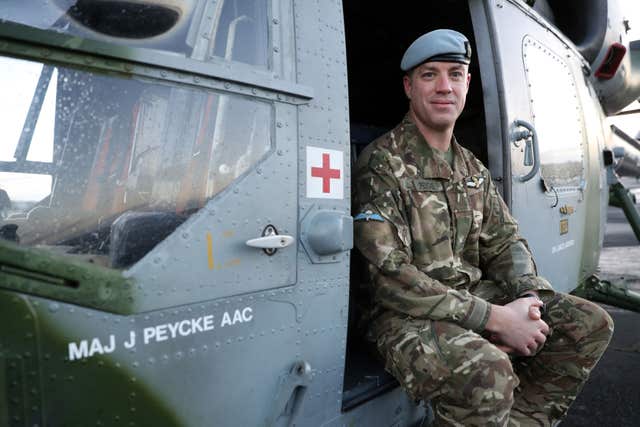
Age finally caught up with the Lynx helicopter as the aircraft embarked on a farewell tour, marking a last salute to the British Army before bowing out of service.
With a distinguished career spanning nearly 40 years, the Lynx entered into service in 1978 and since then, as the Army’s longest serving helicopter, has been used for a variety of tasks.
To mark its decommissioning from service on January 31, on Tuesday the Army Air Corps flew four of the last remaining Lynx helicopters from RAF Odiham in Hampshire on a commemorative tour.
The Lynx flight has set off in glorious sunshine, we’ll be catching up with them later in the day on their tour #Lynxhelicopter @ArmyAirCorps pic.twitter.com/MHh9R9ft8P
— Army in South East (@ArmySouthEast) January 16, 2018
Commanding Officer of 657 Squadron, Major James Peycke, told the Press Association that bidding “farewell to the iconic machine” is a huge moment for everyone who has flown the Lynx over the years.
“It is hugely emotional saying goodbye to the Lynx after six years of flying, and it carves out a big chunk of your heart,” he said.
Describing the aircraft as “hugely manoeuvrable”, Maj Peycke said there is “never a dull day when you are flying” one.

The four Mk9 Lynx lifted off to thunder around the UK’s skies, taking in sites and locations including Yeovil, Middle Wallop and Upavon, before also flying in formation, led by a Chinook helicopter, along the length of the River Thames in central London.
Speaking before they departed, Maj Peycke, who was flying in the lead Lynx, said they would have liked to include more locations on the tour but were restricted by winter daylight hours.
When pressed on how he will feel as the wheels touch down for one of the final times at RAF Odiham, he said it would be an “incredibly emotional moment”.
“Not only does it mark the out-of-service date for the Lynx, the 75th anniversary of the squadron (657) which was formed in 1943, but also the closure of the squadron (in May) and the end of my tour as an officer commanding, so it will be an incredibly emotional moment, particularly as we come back in – I’m probably going to have a lump in my throat,” he added.
Today we say goodbye to the Lynx. Let us know if you see it on it's final flight pic.twitter.com/ZXFNe6S1Ur
— British Army (@BritishArmy) January 16, 2018
Described as a primary battlefield utility helicopter, over the decades the Lynx has also destroyed tanks, evacuated the wounded, gathered intelligence, and provided humanitarian support.
It has been deployed on operations across the world, including the jungles of South East Asia and Central America, the sub-zero Arctic, the Middle East, and has supported troops on active service in Bosnia, Kuwait, Afghanistan and Sierra Leone.
Staff Sergeant Nathan Sharples, one of the pilots flying the lead Lynx, when asked if the helicopter being decommissioned is a loss, said it is not, that things need to progress, and it is now “time for the old girl to retire”.
“She has served us proud throughout the years,” added the 34-year-old, who has only ever flown the Lynx.
The Lynx is set to be replaced within the British Army by the Wildcat, which has more powerful engines and can operate at a higher altitude.
The Army Air Corps’ #Lynxhelicopter makes its last flight in British military service today. Here’s a sneak preview of the paintwork on the Lynx that will lead the commemorative air procession around the country. pic.twitter.com/Kc1YTs7zBC
— British Army (@BritishArmy) January 16, 2018
Air Trooper Toby Tibbitts, a ground crew specialist, who has been in the military for two-and-a-half years, said this is his first and only squadron so far, and seeing the Lynx go is a “sad day” but a proud one.
Quizzed about his favourite moment involving the helicopter, he said fast roping out of a Lynx over a desert was a “pretty special experience” and one he will not forget.
He said the replacement Wildcat “seems like a good aircraft”, and that, with the positive trials and exercises, plus upgraded avionics and engines, the “future is looking bright”.
The Lynx was also used by the Royal Navy, whose helicopters went out of service in March last year after more than 41 years of operations.
As a workhorse of the military over the years, the Lynx, which carries three crew plus six troops with full kit, has also been involved in a number of tragedies during its years of service.


Comments: Our rules
We want our comments to be a lively and valuable part of our community - a place where readers can debate and engage with the most important local issues. The ability to comment on our stories is a privilege, not a right, however, and that privilege may be withdrawn if it is abused or misused.
Please report any comments that break our rules.
Read the rules here